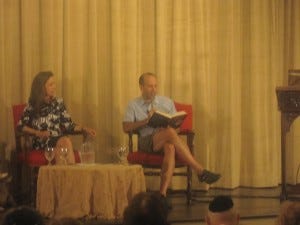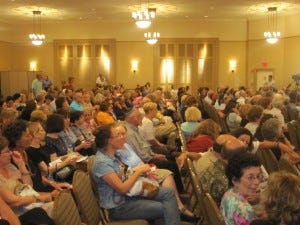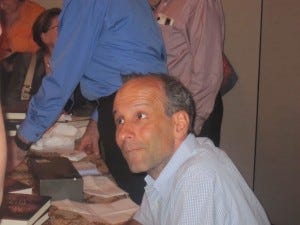news
Fiction in the Rift: Joshua Henkin and Anouk Markovits at Congregation Rodeph Shalom

1. Joshua Henkin, right stage, reads from his novel. Anouk Markovits listens.

On Tuesday night at Congregation Rodeph Sholom, in an auditorium suited for a bar mitzvah, authors Joshua Henkin and Anouk Markovits read and spoke to a room of about 200 people. This number speaks to both the drawing power of a Jewish communal event in the Upper West Side, and the recent popularity of books exploring the insular, closed world of Jewish Ultra-Orthodoxy, such as the Satmar Hasidic community.
Some background: Markovits, born in France, left the Satmar community at the age of 19 to avoid an arranged marriage. Markovits’s first English novel, I am Forbidden, deals with a Hasidic family spanning four generations, focusing — in contrast to a slew of religious rebel novels — on those who stay in the community. In fact, throughout the night, Markovits seemed downright adamant about separating herself from this group of “rebellious” writers.
Henkin, more well-known known to the literary world, only superficially fit into a conversation with Markovits. His new book, The World Without You, does in fact explore the tension between an Orthodox daughter and her secular family, but in no way is that the center of the book, and in only the most tangential way does it compare to Markovits’ very Jewish and purposefully anti-fundamentalist novel. Part of the enjoyment of the night was in realizing the extent of the differences between the two authors, and also in the diversity of the audience members. Rodeph Sholom, a Reform synagogue, played host with The Jewish Week to an audience of secular, modern Orthodox, reform, conservative and even ultra-Orthodox Jews, who were sprinkled throughout the crowd in their more traditional dress.
In line with both his passion and job as the director of Brooklyn College’s MFA program, Henkin spoke in a very engaging, didactic manner quoting O’Connor, Tolstoy, Nabokov, and Annie Hall — the latter quoted word for word in a pitch perfect, playful jab at the crowd and himself. Overall, Henkin attempted to steer the crowd and the questions back to the topic of fiction and actual books, as opposed to the more salacious topic of religious rift. Markovits spoke like an academic, which makes sense, given her numerous degrees. Though clearly a passionate writer, she tended to speak more of concepts: the complex relationship between religious law and the autonomy of our body, etc. Markovits quoted Hannah Arendt, amongst other thinkers, while Henkin focused on the art of fiction.
1. The crowd listens attentively. 2. Henkin fields a stream of questions.


Regardless of the tenuous connection between the books and their authors, the discussion elicited some beautiful responses on the challenges of writing in a non-native tongue, the functions of fiction, the dangers of fundamentalism, and the general process of writing.
The event itself, in a sort of oddly postmodern way, spoke to the current obsession with porous religious borders, even in the more religious community. Most of the questions directed to Markovits were about a personal past she did not want to speak of, and those directed to Henkin tried to eke out any sort of religious controversy. The crowd seemed to be hungry for something tendentious that the authors, both consummate professionals, would not indulge in.
The crowd commented as much as they asked questions, opining on different issues at the authors instead of engaging in a dialogue. In perhaps the greatest moment in my short history of attending these events, an eccentric woman barked some sort of hateful screed about Satmar Hasidim, with which Markovits kindly disagreed. The women persisted until the whole crowd, at the same time, groaned at her to be quiet. Such are the pains and joy of a familial community.
***
— Joe Winkler is a freelance writer living on the Upper West Side. You can follow him here.









